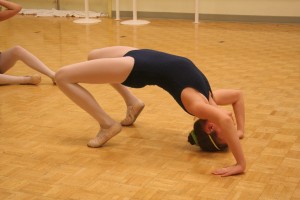[podcast]https://edwardwillett.com/wp-content/upLoads//2011/03/Stretching-the-Truth.mp3[/podcast]
 Exercise is good for you. It’s a shame, since I personally find the whole sweating/breathing hard/ hurting thing a (literal) pain, but I don’t believe I can mount a successful argument as to why sitting on your rear end eating junk food all day is actually better for you, even though evolution seems to have inclined us to do it.
Exercise is good for you. It’s a shame, since I personally find the whole sweating/breathing hard/ hurting thing a (literal) pain, but I don’t believe I can mount a successful argument as to why sitting on your rear end eating junk food all day is actually better for you, even though evolution seems to have inclined us to do it.
(It’s interesting to note that “survival of the fittest” is only one letter away from “survival of the fattest,” and one reason we’re so fond of high-calorie foods is that when food is in short supply, it really is the fattest who are the fittest to survive. But I digress.)
I’m not very good about exercising. I periodically begin it, and periodically end it, and have never managed to make it an everyday habit on the scale of something that really matters to me, like blog-reading.
But when I do exercise, the one part I’ve always hated more than the exercise itself is the stretching we’ve long been told to precede it with. Stretching is boring and takes too long.
Which is why I take a certain perverse pleasure in pointing out that science keeps studying stretching, and keeps finding out that it doesn’t work as long advertised.
Several years ago, as I reported in a previous column on this topic—allow me to quote myself—“the Centers for Disease Control and Prevention reviewed 361 research studies done by its epidemiology program office and found no evidence that stretching either before or after exercise prevents either injury or muscle soreness.
“In fact,” I wrote, “some sports medicine experts say static stretching actually inhibits performance, decreasing power and speed, and can cause micro-tears in tendons, ligaments and muscles. Nor is stretching going to help you work out a strain: stretching it makes it worse, not better. Strained muscles should be rested, and then the focus should be on rebuilding strength.”
Now another study has come out saying, basically, that pre-running stretching doesn’t do anything.
Presented at the 2011 Annual Meeting of the American Academy of Orthopaedic Surgeons (AAOS), the study included 2,729 runners who run ten or more miles per week. (Yuck!)
They randomly split these runners into 1,366 stretchers and 1,363 non-stretchers. The stretchers stretched their quadriceps, hamstrings, and gastrocnemius/soleus muscle groups (gastrocnemius/soleus sounds to me like a debilitating stomach virus, but never mind) for three to five minutes before running.
The result? Stretching before running neither prevented nor caused injury.
Daniel Pereles, an orthopedic surgeon from Montgomery Orthopedics near Washington, D.C., was the study author. He’s a runner himself, and he went into the study fully expecting that stretching would help prevent injury. Instead, the researchers found the risk factors were quite different: “The more mileage run or the heavier and older the runner was, the more likely he or she was likely to get injured, and previous injury within four months predisposed to even further injury,” Pereles said.
So, if you’re a runner who stretches, should you stop stretching? Probably not. The other group of people most likely to be injured were runners who typically stretch as part of their routine but, because they were placed into the non-stretch group, quit doing it for the purposes of the study.
Or, as Pereles put it, “An immediate shift in a regimen may be more important than the regimen itself.”
If you stretch before working out, then, by all means continue. But no need to look askance at those who don’t. It’s just as likely you’ll be limping as they will the next time you meet.
Honesty, alas, compels me to point out, as I did in my previous stretching column, that stretching does have other benefits than preventing injury: do it every day for three months, and you’ll gain flexibility. And stretching after exercise can be beneficial for seniors, because it helps minimize the effects of arthritis and joint degeneration, and athletes, because stretching after a strenuous workout reduces lactic acid accumulation in heavily exercised muscles.
But if someone chides you for not stretching before running, tell them science is on your side.
Just don’t tell them science said you shouldn’t exercise at all. I’m afraid that would be stretching the truth.
(The photo: Ouch!)







